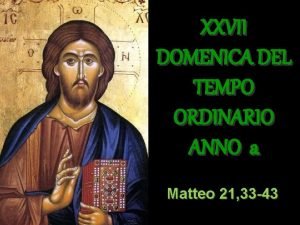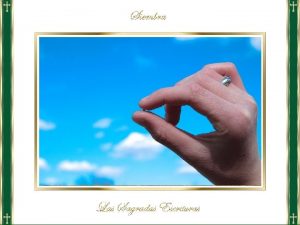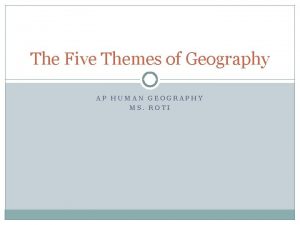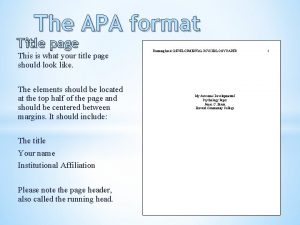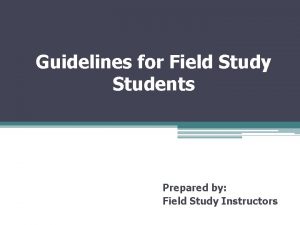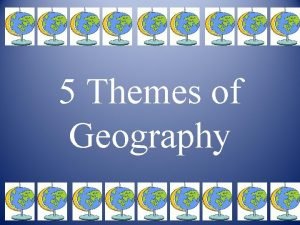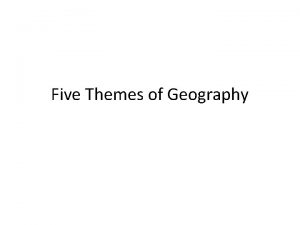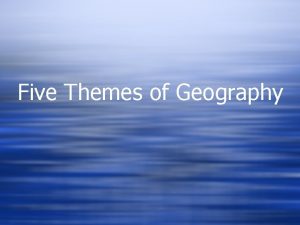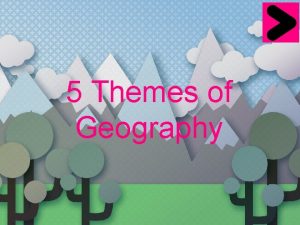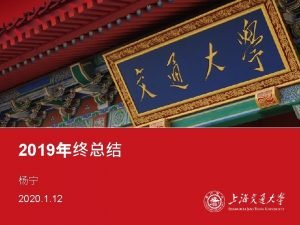Geography Themes PAGE XXVII Geography The study of








- Slides: 8

Geography Themes PAGE XXVII

Geography ØThe study of the earth and its features. • All civilizations have had to control their surroundings in order to survive. Ø 5 themes that help us understand the different ways in which geography has helped shape the story of world history. • Location • Human/Environment Interaction • Region • Place • Movement

Location SINGAPORE: Latitude/Longitude (Absolute Locations) Singapore: (capital city) 1° 21' N, 103° 49' E Singapore is in both the northern and eastern hemispheres, located immediately north of the Equator, and is positioned off the southern edge of the Malay Peninsula between Malaysia and Indonesia. Singapore is bordered by the Strait of Johar and the Strait of Singapore. ØWhere in the world is it? ØAbsolute location: • Point of latitude and longitude • Latitude- degrees north or south from equator • Longitude- degrees east or west from the Prime Meridian ØRelative location • Describes where it is in terms of other areas. What is the absolute and relative location of Singapore?

Human/Environment Interaction Ø Humans have changed and been changed by their environment. • How have humans changed their environments? • How has the environment changed humans? • How do you think humans have affected the environment of Singapore? • Singapore has 12. 000 people per square mile. The United States has 71 people per square mile. • What environmental challenges does the overpopulation of Singapore pose?

Region Ø Any area that has common characteristics. Ø This may include: • Physical factors like landforms or climate • Cultural aspects like language or religion How would you describe the region Singapore is in?

Place- What does the area look like? Singapore’s physical • 57 small islands are included in it’s border. • 120 miles of coastline. • Singapore has 840 flowering plants and over 500 different species of animals. • Singapore has a tropical rainforest climate with that is always hot and humid with lot of rains. Temperatures during day time drift continuously around 86°F, while night time temperature drops below 73°F and the high humidity makes this uncomfortable. Singapore’s cultural • Speak Chinese, English, Maylay, Hokkien, Cantonese, and Tamil. • Buddhist, Sunni Muslim, Roman Catholic, and Hindu make up the religions of the country. • The culture of Singapore is influenced heavily by British, Dutch, Portuguese, Malay, South Asian, East Asian and Australian cultures.

Movement ØThis is the transfer of people, goods, and ideas from one place to another. • “History is the story of movement. ”- people have consistently migrated to better places to live, traded with distant people, and spread a wealth of ideas from culture to culture. • Singapore ranks 5 th in the world for globalization- the process of international integration arising from the interchange of world views, products, ideas and other aspects of culture. What about Singapore’s geography makes it the ideal place for the trading of goods? • It is important to remember that movement is not always a positive thing. Explain how movement can be negative for a country.

Exit ticket: Seattle In your daily notebook, you will use the notes and/or your textbook to describe Seattle using the 5 geography themes. 1. Location 2. Human/Environment Interaction 3. Region 4. Place 5. Movement You must use complete sentences. Each theme needs at least 1 complete sentence.
 Parafrasi canto 27 inferno
Parafrasi canto 27 inferno Domingo xxvii tiempo ordinario ciclo b
Domingo xxvii tiempo ordinario ciclo b 27 domenica tempo ordinario anno b
27 domenica tempo ordinario anno b Xxvii domenica del tempo ordinario anno b
Xxvii domenica del tempo ordinario anno b Lecturas del domingo xxvii del tiempo ordinario ciclo b
Lecturas del domingo xxvii del tiempo ordinario ciclo b 5 themes of geography ap human geography
5 themes of geography ap human geography Header apa format
Header apa format Introduction for field study
Introduction for field study Hát kết hợp bộ gõ cơ thể
Hát kết hợp bộ gõ cơ thể



